|
|
|
Sort Order |
|
|
|
Items / Page
|
|
|
|
|
|
|
| Srl | Item |
| 1 |
ID:
133777
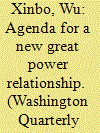

|
|
|
|
|
| Publication |
2014.
|
| Summary/Abstract |
Well begun is half done," Aristotle once said, meaning that beginning a project well makes it easier to do the rest. Yet, this may not be true of China-U.S. relations during Obama's presidency. Although the Obama administration secured a smooth transition from the George W. Bush years and attached high priority to relations with China during its first year in office, bilateral relations turned downward over the rest of Obama's first term, leaving a legacy of growing mutual suspicion and rising competition between the two countries, especially in the Asia-Pacific region. In spite of the November 2009 bilateral agreement to build a "positive, cooperative, and comprehensive relationship,"1 the two sides missed opportunities for more cooperation while mishandling and even misguiding bilateral ties on some points.
|
|
|
|
|
|
|
|
|
|
|
|
|
|
|
|
| 2 |
ID:
133778
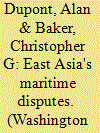

|
|
|
|
|
| Publication |
2014.
|
| Summary/Abstract |
Few doubt that China's rise is this era's principal driver of strategic change, just as the United States' equally influential ascendancy shaped the last. But earlier optimism that the Middle Kingdom's re-emergence as a major power would be largely benign is fading as evidence mounts that Beijing is determined to press its territorial and resource claims in the vitally important seas of the Western Pacific. In barely the blink of a geopolitical eye, China's once lauded charm offensive has given way to exactly the kind of coercive behavior its critics have long predicted.1 In a 3,000-mile maritime arc running from the East China Sea to the southern reaches of the South China Sea, Beijing is at loggerheads with many of its neighbors, including erstwhile friends, over several linked territorial and resource disputes. If not wisely managed, these disputes could bring East Asia's long peace to a premature and bloody end.
|
|
|
|
|
|
|
|
|
|
|
|
|
|
|
|
| 3 |
ID:
133775


|
|
|
|
|
| Publication |
2014.
|
| Summary/Abstract |
Because autocrats can rarely be voted out of power, most find themselves exiting office in far less conventional ways. Since the 1950s, the coup d'état-or the illegal seizure of power by the military-has been by far the most common.1 During the 1960s and '70s, for example, about half of all autocrats who lost power did so through a coup. But fast-forward to the 2010s, and a different picture is emerging. The chain of protests during the Arab Awakening, which toppled four of the world's longest-standing rulers-Zine al-Abidine Ben Ali of Tunisia, Hosni Mubarak of Egypt, Muammar Qaddafi of Libya, and Ali Abdullah Saleh of Yemen-led many political observers to rejoice in the masses' ability to unseat autocratic strongmen. But are these revolts evidence that autocrats are becoming increasingly vulnerable to the masses? Or are they short-term exceptions to a longer-standing rule of autocratic ouster?
|
|
|
|
|
|
|
|
|
|
|
|
|
|
|
|
| 4 |
ID:
133776
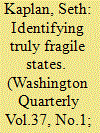

|
|
|
|
|
| Publication |
2014.
|
| Summary/Abstract |
That the Arab Spring caught the world off guard is hardly surprising. Interpreting overt stability as a reflection of fundamental strength or resiliency has often set the international community up for surprise. Few forecast the dissolution of the Soviet Union, for example; far too few in Washington anticipated what would follow the invasion of Iraq. These are reminders that apparent stability can be little more than an illusion.
|
|
|
|
|
|
|
|
|
|
|
|
|
|
|
|
| 5 |
ID:
133773
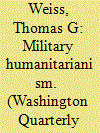

|
|
|
|
|
| Publication |
2014.
|
| Summary/Abstract |
Pundits claim that the war in Syria has sounded the death knell for humanitarian intervention and the Responsibility to Protect (R2P)-resquiescat in pace, according to David Rieff.1 By failing to intercede in that country's brutal civil war, many believe the international community effectively turned its back on an important emerging international norm, one that over 150 heads of state endorsed at the UN's 2005 World Summit.2
|
|
|
|
|
|
|
|
|
|
|
|
|
|
|
|
| 6 |
ID:
133774


|
|
|
|
|
| Publication |
2014.
|
| Summary/Abstract |
U.S. politicians often work the topic of oil import independence into their campaign rhetoric as an ideal that would help separate U.S. economic prosperity and military responsibility from the volatility of Middle Eastern politics. In theory, oil independence would mean that events such as the Iranian revolution or internal political unrest in key Arab oil producers would have much less direct impact on the flow of oil to the United States, and thus U.S. prosperity (even if, in a global market for oil, the price impact of any supply disruption is shared by all consuming countries). More importantly, intra-state conflicts such as the Iraq-Iran war or the Iraqi invasion of Kuwait would not necessarily require large-scale U.S. military involvement to ensure oil production and exports to the United States and its allies. This linkage between U.S. oil import dependence and military commitment to the Gulf region has given rise to a myth favored by policymakers, markets, and the public that if the United States could attain oil independence, we could also reduce our military responsibilities around the world. Recent and ongoing changes in both the oil sector and in political-military strategy are for the first time in forty years combining in a manner that is leading some to believe this story could come true.
|
|
|
|
|
|
|
|
|
|
|
|
|
|
|
|
| 7 |
ID:
133782
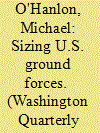

|
|
|
|
|
| Publication |
2014.
|
| Summary/Abstract |
During the Cold War, the United States varied between a "1 ½ war" and a "2 ½ war" framework for sizing its main combat forces. This framework prepared forces for one or two large wars, and then a smaller "half-war." Capacity for a major conflict in Europe, against the Soviet Union and its Warsaw Pact allies, represented the enduring big war potential. This period saw simultaneous conflict against China as a second possible big war, until Nixon's Guam doctrine placed a greater burden on regional allies rather than U.S. forces to address such a specter, and until his subsequent opening to the PRC made such a war seem less likely in any event. The half-wars were seen as relatively more modest but still quite significant operations such as in Korea or Vietnam.
|
|
|
|
|
|
|
|
|
|
|
|
|
|
|
|
| 8 |
ID:
133779
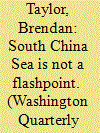

|
|
|
|
|
| Publication |
2014.
|
| Summary/Abstract |
Two important anniversaries arrive in 2014 for protracted South China Sea disputes. January 19 marked 40 years since Chinese and Vietnamese forces clashed over the Paracel Islands, resulting in the deaths of more than 50 Vietnamese personnel and an undisclosed number on the Chinese side-at least the second-largest loss of life to have occurred in any single incident involving these disputed waters. Late 2014 will also mark 20 years since China controversially built structures on the aptly named Mischief Reef in the Spratly Islands, prompting a further series of incidents at sea. Recent reports that China has moved large concrete blocks to Scarborough Shoal-yet another disputed reef that was the scene of an April 2012 standoff between Chinese and Philippines vessels-have sparked concerns in Manila that history is repeating.
|
|
|
|
|
|
|
|
|
|
|
|
|
|
|
|
| 9 |
ID:
133780
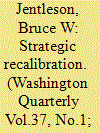

|
|
|
|
|
| Publication |
2014.
|
| Summary/Abstract |
The release of the Obama administration's 2014 National Security Strategy comes amidst increasing criticism of its strategic savvy. Some are rank partisan, some Monday-morning quarterbacking. Some, though, reflect the intensifying debate over the optimal U.S. foreign policy strategy for our contemporary era.
At one end of the debate are those advocating retrenchment, who see limited global threats on one hand and prioritize domestic concerns on the other-be they the budget-cutting of the Tea Party right or the nation-building-at-home of the progressive left. At the other end are neoconservatives and others pushing for re-assertiveness. This is based on a bullish assessment of U.S. power and the contention that it still is both in the U.S. national interest and that of world order for the United States to be the dominant nation. While retrenchment overestimates the extent to which the United States can stand apart, re-assertiveness overestimates the extent to which it can sit atop.
|
|
|
|
|
|
|
|
|
|
|
|
|
|
|
|
| 10 |
ID:
133781


|
|
|
|
|
| Publication |
2014.
|
| Summary/Abstract |
The leading challenge for U.S. grand strategy over the next decade is to exercise persistent global leadership under the shadow of intensifying constraints. These include fiscal shortfalls that limit resources, fading international deference to U.S. wishes, mismatches between the leading security challenges and instruments of power to confront those challenges, and the loss of key military superiorities alongside the appearance of new vulnerabilities. At stake are international stability and the safety of the U.S. homeland. The primary task for U.S. strategists now is to find a sustainable global role more appropriate to available means that can safeguard leading U.S. interests and avoid embroiling more limited U.S. power in secondary issues.
|
|
|
|
|
|
|
|
|
|
|
|
|
|
|
|
|
|
|
|
|